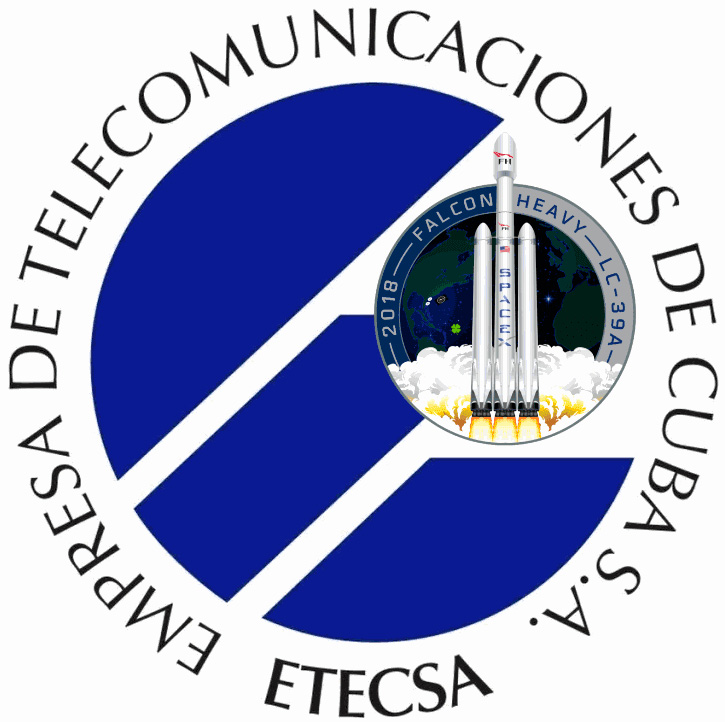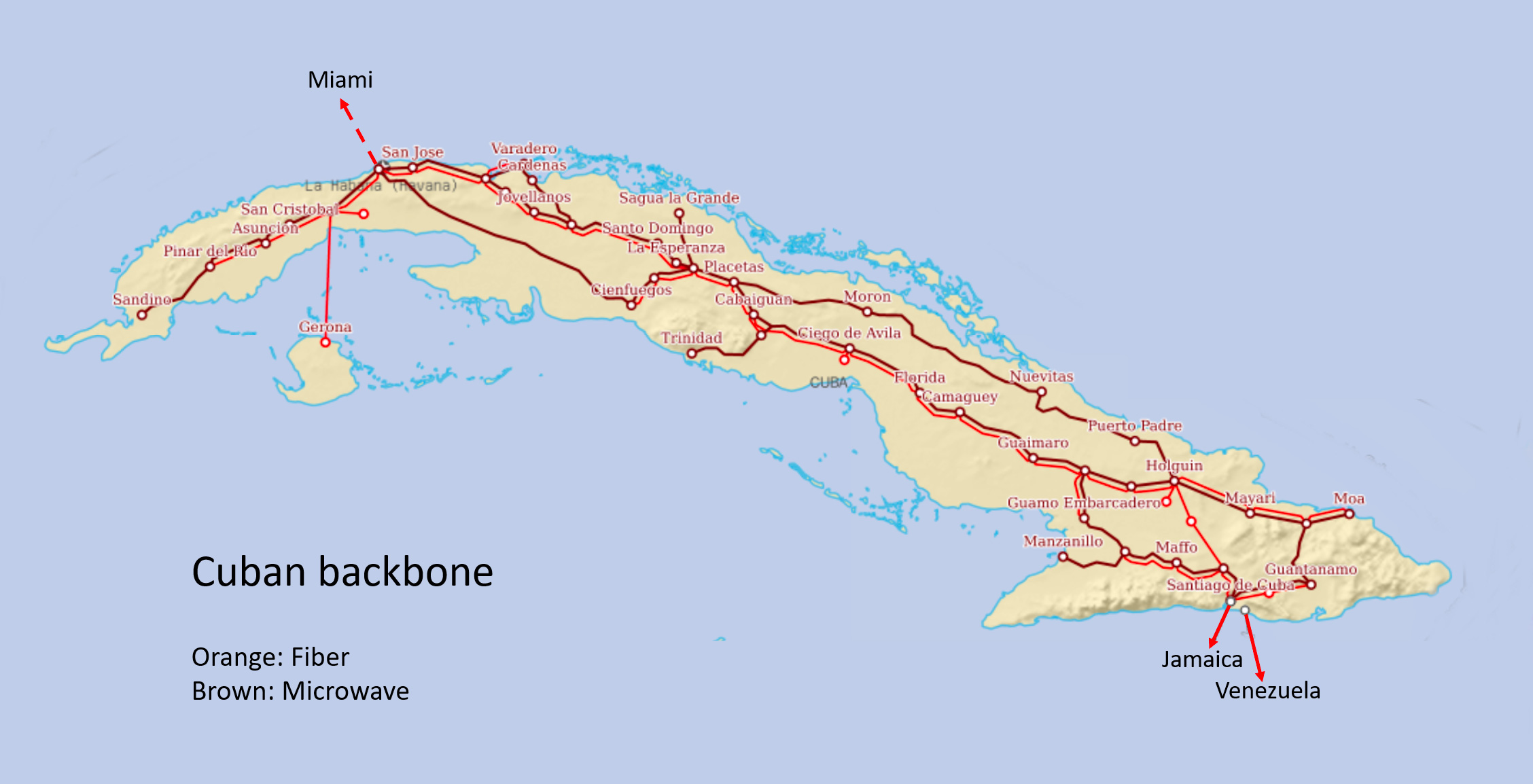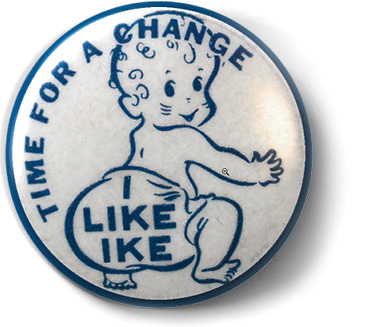


|
||
|
||
In a post last week, I advised Cuban President Díaz-Canel that investment in fixed broadband Internet would benefit both the Cuban people and his regime. This week, I’ve got advice for US President Biden—don’t try to out-pander the Republicans and call President Díaz-Canel’s bluff by offering support for fixed broadband.
Claiming that the recent protests were a “United States-backed, social media-driven plot to stir up public discontent and overthrow the Cuban regime,” the Cuban government blocked Internet access on July 11th. That prompted FCC Commissioner Brendan Carr to endorse Florida’s Governor Ron DeSantis’ call for President Biden to “provide the necessary support for American enterprises to deliver Internet service to the Cuban people.” Senator Rubio and other Republican politicians agree and Commissioner Carr assured us that “we have the technical capability to do this.”
When asked about the technology in a subsequent interview, Commissioner Carr reasserted his confidence that we could do it, but said he didn’t “want to get too bogged down in the particulars of that because my sense is there’s going to be other technologies that I’m not aware of, including from DOD or CIA, that can also help facilitate this.” I’ll try to keep an open mind when read about those DOD and CIA technologies but, for now, I don’t see how it can be done.

I’ve seen suggestions that it could be done using forthcoming low-Earth orbit satellite constellations like SpaceX Starlink, but there are problems with that. Earlier attempts to smuggle in end-user terminals by Alan Gross and others disguised as surfing equipment have failed spectacularly. (Gross spent five years in prison). Furthermore, they would have been inconsequential drops-in-the bucket had they succeeded. Finally, if we could get even one Starlink terminal into Cuba, would SpaceX would be willing to flaunt international law and connect to it without Cuban permission?
Another “solution” is to deploy balloon-based mobile phone towers in the stratosphere, creating an alternate cell phone company that could use Cuban mobile phones. Do they have the technology to do that? How about getting SIM cards for the “US BallonNet” mobile phone company into Cuban handsets?
If they did get SIM cards to the people, what about radio interference with Cubacel’s terrestrial towers? I’m not a lawyer, but transmitting without Cuban permission sounds like a violation of international law or at least custom, but that wouldn’t bother Commissioner Carr because he “doesn’t care.” In a recent interview, he said, “The pinheads at the ITU (UN International Telecommunication Union) will likely view this as a violation of international law. So we need to stand up the support of the federal government to do this.” (Ex-FCC Chairman Pai also participated in the interview).
Others have suggested that we offer support for the Psiphon VPN service. I believe we are already doing that and on July 15 nearly 1.4 million Cubans used Psiphon. Psiphon support was a good idea.
How about hotspots near the US Embassy or using wireless backhaul from offshore? How many people would a hotspot reach, and how long would it take the Cuban government to arrest them?
From Eisenhower’s embargo to the Bay of Pigs invasion to Trump’s trade, financial, and tourism restrictions and declaring Cuba a state sponsor of terrorism, the hard-line has failed to dislodge the Cuban regime.

In spite of its apparent impossibility, the call to “beam the Internet to the Cuban people” puts President Biden in a political bind. He has responded by stating that he is “actively collaborating with the private sector to identify creative ways to ensure the Cuban people have safe and secure access to the free flow of information on the Internet.” While it may not be possible to achieve that goal using technical subterfuge, there is another possibility—he can go over the heads of the Cuban leaders and make well-publicized offers of assistance to the Cuban people. Let me outline two such offers.

Smuggling SpaceX Starlink terminals into Cuba is a dead end, but SpaceX offering service in Cuba would be possible if both SpaceX and the Cuban government would agree to do it. I suspect that iconoclastic Elon Musk would be willing—it would be good business and good karma.
Díaz-Canel and ETECSA executives would be a harder sell. Diplomacy and a well-publicized offer that was visible to the Cuban people would put pressure on the Cuban regime. If the campaign succeeded and Starlink became available in Cuba, it would benefit the people and therefore, in the long run, relax the grip of the Cuban regime.
An undersea cable connecting the US and Cuba would also improve the Cuban Internet. Today the vast majority of Cuba’s international Internet traffic is carried on the ALBA-1 undersea cable at the southeast end of the island, far from Havana and other population centers to the west. There have been at least half a dozen proposals to connect Cojimar, near Havana, to Florida. Doing so would provide backup in case of a temporary problem on the ALBA-1 cable, cut average latency time on international links, and, most important, reduce the load on Cuba’s terrestrial backbone, saving terrestrial infrastructure investment.

The most recent of these proposals was for a branch from the ARCOS undersea cable to a landing point at Cojumar. The ARCOS consortium applied for permission on July 23, 2018, and the application was approved for “streamlined processing procedures”—45 days—by the FCC. It had still not been acted upon when it was withdrawn without comment on October 20, 2020.
President Biden could authorize the re-activation of the ARCOS application, and, if it is no longer on the table, a suitable alternative could be found. There was also talk at one time of eventually turning the undersea cable running from our base at Guantánamo to Florida. That could also be done, although a cable landing near Havana would be more valuable.
One last Internet-related item. While The President lacks the authority to fire FCC commissioner Carr, he should call for his resignation. A US official advocating violation of international law is embarrassing and Putin-worthy.
Before concluding, allow me a quick digression. Improving the Internet is a long-run project, but the pandemic requires immediate action. President Biden should immediately remove any supply chain and financing barriers impeding Cuba’s ability to acquire, manufacture and distribute COVID 19 vaccine and related medical equipment.

The US has been trying to overthrow the Cuban government for over 60 years at great cost to us and the Cuban people. The hard-line strategy was initiated by President Eisenhower during the Cold War between the US and the Soviet Union. His fear of the Soviet Union was based upon profound personal experience as the general who led the allied invasion of Europe and watched the Iron Curtain fall
When he ran for president, Eisenhower had two slogans—“I like Ike” and “It’s time for a change.” Today, the Soviet Union has collapsed and our current global rival, China, is eating our lunch in Cuba. It’s time for a change in our Cuba Internet strategy.
Sponsored byDNIB.com

Sponsored byCSC

Sponsored byRadix

Sponsored byVerisign

Sponsored byWhoisXML API

Sponsored byVerisign

Sponsored byIPv4.Global
